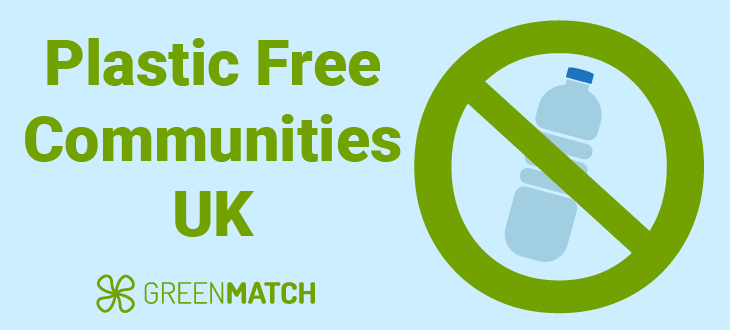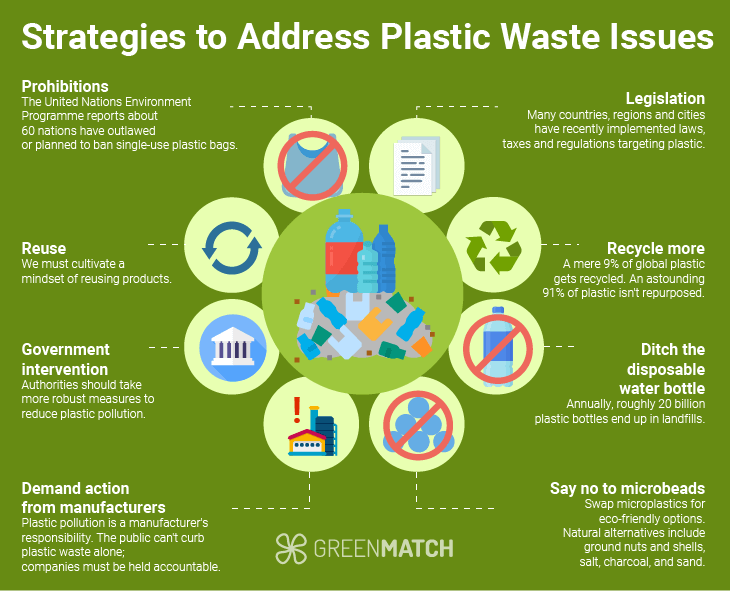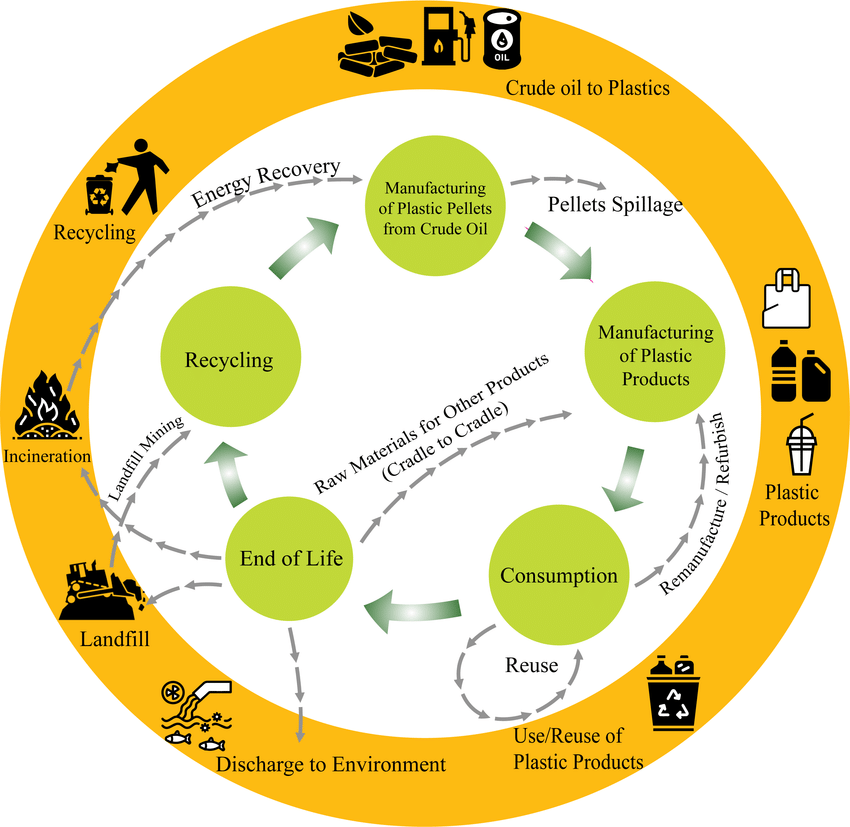- GreenMatch
- Blog
- Plastic-Free Communities in the UK
Plastic-Free Communities in the UK: Leading the Fight Against Plastic Pollution


Plastic pollution is a severe problem worldwide, including in the United Kingdom. UK households throw away an estimated 100 billion pieces of plastic packaging annually, making it urgent to find workable ways to deal with this problem.
Enter the Plastic-Free Communities initiative, a local effort led by Surfers Against Sewage (SAS) to address plastic pollution from its beginning. This campaign has motivated more than 700 communities across the UK to act, with 114 already earning Plastic-Free status.
Today, about 30 million Britons reside in areas striving to become plastic-free, and more than 4,500 businesses pledge to decrease the use of single-use items. The outcomes are impressive: Areas involved remove 43 million single-use plastic items yearly. Besides environmental effects, participating in this initiative strengthens community unity, with 80% of participants feeling closer to their local surroundings.
The Plastic-Free Communities network helps local councils, businesses, schools, and people eliminate single-use plastics and use sustainable ways. From coastal towns such as Penzance, the first UK community to get Plastic-Free status, to cities like Plymouth, which have spread this work throughout the city, these communities are at the forefront of fighting plastic waste.
Global plastic production is expected to create 2.1 gigatonnes of CO2 emissions by 2040. Initiatives like Plastic-Free Communities bring hope. By bringing together diverse groups and giving actionable instructions, this movement shows how local actions can result in significant changes in environmental issues.
Let's explore the UK's top and bottom plastic-free communities, analysing both regional and city levels.
Overview of Plastic-Free Communities
The Plastic-Free Communities project, started by Surfers Against Sewage (SAS) in 2017, marks a local effort to fight plastic pollution. This creative initiative connects local governments, companies, schools, and people to remove single-use plastics and embrace green habits in UK towns and cities.

Key Objectives
To achieve Plastic-Free Community status, participants must meet five objectives:
- Collaborate with local councils.
- Encourage businesses to reduce single-use plastics.
- Engage community groups, schools, and organisations.
- Organise events and actions.
- Establish steering groups to drive progress.
Impact and Reach
Since its inception, the initiative has seen remarkable growth:
- 831 communities signed up.
- 29.4 million people live in participating communities.
- 43 million single-use plastic items are reduced annually.
- 4,590 businesses enrolled, driving 90% of plastic reduction.
- 230 councils pledged support.
- 16,620 volunteers involved.
Broader Influence
The campaign has ignited many environmental and sustainability efforts all over the UK. It has also strengthened community connections, with many people feeling closer to their neighbours.
Plastic-Free Communities decrease plastic waste and help develop environmental awareness and community unity. This initiative provides a model to create sustainable, community-led environmental actions throughout the UK.

Image credit: Rakesh Kumar - Highlights for the life cycle assessment and circular economy of plastic products
Top Plastic-Free Communities in the UK
The UK has many groups at the forefront of fighting plastic pollution. These groups use creative methods and have reached important goals in cutting down single-use plastics. Here, we feature some of the best plastic-free groups, showing their successes and influence.
Penzance
Penzance is the first UK town to achieve Plastic-Free status. The community's efforts, including extensive clean-ups and awareness campaigns, have set a precedent for other towns. Penzance's success has inspired many different communities to join the plastic-free movement.
Leamington & Warwick
In January 2020, Leamington & Warwick became the 100th accredited Plastic-Free Community. This achievement resulted from extensive collaboration with local businesses, schools, and councils. The towns developed a comprehensive plastics plan, helping flagship events go plastic-free and inspiring residents to make sustainable changes.
Our community's commitment to reducing plastic waste has been truly inspiring. We've made significant strides towards a more sustainable future together.
Canary Wharf
Canary Wharf, the world's first commercial centre to achieve plastic-free status, has made remarkable strides in reducing plastic waste. The area eliminated over 2 million single-use plastic items and recycled 4 million coffee cups. Additionally, a sea bin installed in the waterways collects 30kg of plastic monthly, showcasing innovative solutions to urban plastic pollution.
Plymouth
Plymouth stands out as the largest UK community to gain plastic-free status. The city's commitment began in December 2017 and expanded citywide by June 2019. Plymouth has eliminated over 80 plastic products from everyday use, trained more than 200 representatives, and organised numerous events to promote plastic reduction.
Whitstable
Whitstable, located in Kent, became the first in its county to earn Plastic-Free status from Surfers Against Sewage. The Plastic Free Whitstable group, created by residents, played a crucial role in this achievement. The town's dedication to reducing plastic waste included various community events like monthly beach clean-ups and working with local businesses to lower plastic use. Whitstable has thus become a model for other towns wishing to reach similar environmental objectives.
Aberystwyth University
Aberystwyth University became the first university to gain plastic-free accreditation. The institution adopted policies to reduce single-use plastics across campus, demonstrating that educational institutions can play a pivotal role in the plastic-free movement.
These communities exemplify the power of collective action in combating plastic pollution. Their achievements provide a roadmap for other towns and cities aiming to reduce plastic waste and foster sustainable practices.
To provide a list of the top ten UK cities to reduce plastic waste ranked by their scores:
| Rank | City | Impact Score |
|---|---|---|
| 1 | Penzance | 9.5 |
| 2 | Whitstable | 9.0 |
| 3 | Lyme Regis | 8.8 |
| 4 | Hastings | 8.7 |
| 5 | Jersey | 8.5 |
| 6 | North Devon | 8.3 |
| 7 | Broad Haven | 8.2 |
| 8 | Little Haven | 8.2 |
| 9 | St Bees | 8.0 |
| 10 | Anstruther | 7.8 |
These rankings are based on the impact of their plastic-free initiatives and the degree of community engagement and support for reducing single-use plastics.
It is important to note that while these cities are at the forefront of reducing plastic, many other UK areas are also advancing in sustainability. For instance, more than 500 communities aim to achieve plastic-free status, and cities such as Manchester and London are implementing wide-ranging recycling programs and conserving green areas.
Bottom Plastic-Free Communities in the UK
While many UK communities have made significant strides in reducing plastic waste, some still face considerable challenges. These cities need better recycling rates, better air quality, and have limited green spaces, making it challenging to achieve Plastic-Free status.
Below, we highlight the bottom plastic-free communities, outlining their key challenges and areas needing improvement.
Nottingham
Nottingham tops the list of the UK's least green cities, with only 23.9% of household waste recycled and an air quality index of 2.31. Despite having 31 nature and park attractions, this equates to just 0.96 per 10,000 people, highlighting the need for more green spaces and better waste management practices.
Sunderland
Sunderland follows closely with a recycling rate of 28.1% and an air quality score of 2.58. The city also needs more green spaces, offering only 0.43 nature and park attractions per 10,000 residents. Efforts to improve plastic-free initiatives include beach clean-ups and litter picks, but more comprehensive strategies are needed.
Glasgow
Glasgow, the only Scottish city in the top three, recycles 27.3% of its domestic waste and has an air quality rating of 2.43. With 45 nature and park attractions or 0.75 per 10,000 inhabitants, the city needs to enhance its green spaces and waste management systems to improve its environmental standing.
Birmingham
Birmingham ranks fourth with the lowest recycling rate of 22.5% among the studied cities. The air quality score is 2.81, and the city provides only 0.54 nature and park attractions per 10,000 people. Birmingham's environmental challenges are significant, requiring robust policies and community engagement to address plastic waste and improve air quality.
Liverpool
Liverpool rounds out the top five, recycling 23.5% of household waste and having an air quality score of 2.63. The city fares slightly better in green spaces, with 0.97 nature and park attractions per 10,000 people. However, Liverpool must still enhance its recycling programs and expand green areas for better environmental outcomes.
These cities are identified as the least effective in terms of plastic-free initiatives and waste management, with the lowest percentages of waste being sent for reuse.
| Rank | City | Impact Score |
|---|---|---|
| 1 | Birmingham | 22.8% |
| 2 | Liverpool | 22.9% |
| 3 | Nottingham | 25.3% |
| 4 | Portsmouth | 27.1% |
| 5 | Southampton | 27.7% |
| 6 | Luton | 28.6% |
| 7 | Coventry | 28.6% |
| 8 | Sunderland | 29.8% |
| 9 | Crawley | 31.4% |
| 10 | Sheffield | 32.1% |
The impact score represents the percentage of waste each city sends for reuse, recycling, or composting. A lower impact score indicates a higher percentage of waste sent to landfills or incineration, thus reflecting poorer performance in waste management and plastic-free initiatives.
Addressing the Challenges
These communities face notable challenges in their efforts to become plastic-free. Improving recycling rates, enhancing air quality, and increasing access to green spaces are critical to advancing their environmental initiatives. Public awareness campaigns, stronger local government policies, and community involvement are essential for driving change and achieving sustainable urban environments.
We aim to inspire action and support for more effective plastic reduction strategies across the UK by highlighting the struggles and potential solutions for these bottom plastic-free communities.
Regional Analysis of Plastic-Free Initiatives in the UK
This regional analysis highlights the diverse approaches and achievements of Plastic-Free Communities across the UK. We aim to inspire further action and support for plastic reduction efforts nationwide by showcasing successful initiatives and addressing ongoing challenges.
Plastic-Free Initiatives in England
England has seen significant momentum in plastic-free efforts, with numerous communities joining the movement:
- Penzance in Cornwall became England's first plastic-free town in 2017, setting an example for others.
- Many coastal towns, including Plymouth, Hastings, Brighton, and Bude, have embraced plastic-free status.
- Over 80 plastic products are removed from daily use to gain plastic-free status. The city has trained more than 200 representatives and organised numerous events to promote plastic reduction.
- Inland cities like Bristol and London have also launched plastic-free campaigns and initiatives.
- Some cities accredited as the 100th Plastic-Free Community have collaborated with local councils, businesses, and schools to implement comprehensive plastic reduction strategies.
Key challenges in England include coordinating efforts across densely populated urban areas and addressing the high consumption rates in major cities.
Plastic-Free Initiatives in Scotland
Scotland has made notable progress in tackling plastic pollution:
- The Isle of Arran became Scotland's first plastic-free community in 2019, recognised by Surfers Against Sewage (SAS).
- Other Scottish islands and coastal towns have followed suit, leveraging their strong connections to marine environments.
- The Scottish government has banned many single-use plastic items, supporting local initiatives.
- Glasgow faces challenges with a recycling rate of 27.3% but continues to make strides with public awareness initiatives and community engagement programs aimed at reducing plastic waste.
Scotland's efforts benefit from governmental solid support but face challenges in reaching remote communities and addressing the needs of its diverse geography.
Plastic-Free Initiatives in Wales
Wales has emerged as a leader in the UK's plastic-free movement:
- Aberporth became Wales' first plastic-free village in 2018.
- Anglesey achieved recognition as the UK's first plastic-free country.
- Aberystwyth became the first major Welsh town to gain plastic-free status.
- Caerphilly, awarded Plastic-Free Community status, has focused on engaging local businesses and residents in plastic reduction efforts.
Wales' success is bolstered by intense community engagement and governmental support, including being the first UK nation to introduce a plastic bag charge.
Plastic-Free Initiatives in Northern Ireland
Northern Ireland has been making strides in reducing plastic waste:
- Keep Northern Ireland Beautiful launched a Plastic Free Events Guide to support positive change.
- Belfast City Council has been recognised for its innovative approach to tackling single-use plastics, including a pilot project providing free reusable period products.
- Lisburn & Castlereagh councils have signed the Plastic Promise, committing to reducing single-use plastics in council operations.
- Local councils are taking action through initiatives like the Plastic Promise, committing to reduce single-use plastics in their operations.
- Community groups and businesses are increasingly joining the plastic-free movement.
Northern Ireland faces unique challenges due to its political situation, but grassroots efforts and council initiatives are driving progress.
Across all regions, common themes emerge:
- Coastal communities often lead the way, driven by direct experiences with marine plastic pollution.
- Local businesses play a crucial role in eliminating single-use plastics.
- Education and community engagement are key to successful initiatives.
- Government support, through legislation and funding, significantly boosts plastic-free efforts.
While each region has its unique approach, the UK is making significant strides towards reducing plastic pollution. The success of these initiatives demonstrates the power of community action in addressing environmental challenges.
How to Join the Movement
Joining the Plastic-Free Communities initiative empowers individuals and groups to make a tangible environmental impact. With over 830 communities already signed up and more than 3,500 Plastic Free Champion Businesses involved, this movement continues to grow rapidly. Here's how you can become part of this transformative campaign:
| Key Steps | Benefits | Available Resources |
|---|---|---|
| Register community with Surfers Against Sewage | Cleaner streets and beaches | Surfers Against Sewage website (plasticfree.org.uk) |
| Form a steering group to lead local efforts | Increased community engagement | Plastic Free July campaign resources |
| Engage businesses to reduce single-use plastics | Positive environmental impact | Marine Conservation Society UK support |
| Collaborate with schools and community groups | Recognition as a sustainable community | City to Sea campaigns |
| Organise awareness events and clean-ups | Potential boost to local tourism | Greenpeace Plastic Pledge |
| Work with the local council for policy changes | Healthier marine ecosystems | Local council environmental departments |
| Achieve Plastic Free Community status | Reduced plastic waste in landfills | Community clean-up event toolkits |
Leveraging Resources
Numerous organisations offer support for plastic-free initiatives. With 4,590 businesses already enrolled, driving 90% of plastic reduction, plans involve expanding the Plastic Free Champion Award. This strategy aims to increase business participation while supporting local economies.
- Surfers Against Sewage provides comprehensive guidance through its website.
- The Plastic Free July campaign offers resources for month-long plastic reduction challenges.
- Marine Conservation Society UK supports coastal communities in their plastic-free journey.
- City to Sea campaigns focus on specific plastic reduction strategies.
- Greenpeace Plastic Pledge helps individuals commit to personal plastic reduction.
By joining this movement, communities contribute to cleaner environments, healthier ecosystems, and sustainable local economies. Every action brings us closer to a plastic-free future, from organising beach clean-ups to advocating for policy changes.
Future of Plastic-Free Communities
The future of plastic-free initiatives in the UK looks promising, with growing momentum and support for reducing plastic waste nationwide. However, significant challenges remain in scaling these efforts and achieving a plastic-free vision.
Here's an overview of the current landscape and future outlook:
Scaling the Movement Nationwide
The Plastic Free Communities initiative, led by Surfers Against Sewage, has successfully mobilised local action across the UK. As of 2024, hundreds of communities have signed up to tackle single-use plastics. This grassroots movement is creating a strong foundation for broader change.
Key strategies for scaling the movement include:
- Linking local communities into regional and national networks to share best practices and amplify impact. For example, the Plastic Free Scotland Communities Network now covers areas from the Clyde to the Northwest Coast.
- Engaging more businesses, schools, and local governments. Telford & Wrekin Council's district-wide approach shows how coordinated efforts can accelerate progress.
- Leveraging digital platforms to connect activists and share resources nationwide.
Addressing Ongoing Challenges
Despite progress, significant hurdles remain. While progress remains impressive, with 831 communities signed up and an estimated 29.4 million people involved, challenges persist. Addressing diverse community needs, maintaining momentum, and effecting systemic change requires ongoing innovation and commitment.
- The scale of the problem: The UK still generates large amounts of plastic waste - an average of 36.1 kg of plastic packaging waste per person in 2021.
- Recycling limitations: Only about 12% of household plastic waste in the UK is recycled. Improving recycling infrastructure and processes is crucial.
- Need for systemic change: While grassroots efforts are important, industry-wide and policy changes are needed to transform the plastic economy truly.
- Consumer behaviour: Shifting ingrained habits around plastic use remains challenging.
Vision for a Plastic-Free UK
The ultimate goal is to create a circular economy for plastics and dramatically reduce plastic pollution. Key elements of this vision include:
- Ambitious targets: The UK aims to eliminate avoidable plastic waste by 2042. More aggressive interim goals may be needed.
- Policy action: Implementing extended producer responsibility, deposit return schemes, and bans on problematic plastics.
- Innovation: Developing plastic alternatives and improving recycling technologies.
- Global leadership: The UK is pushing for a strong global treaty to end plastic pollution by 2040.
Future Outlook
While challenges remain, there are reasons for optimism:
- Growing public awareness and support for plastic reduction.
- Increasing business commitments to sustainable packaging.
- Technological advances in recycling and alternative materials.
- Momentum building for stronger national and international policies.
Initiatives like The Big Plastic Count, which engaged thousands of households in measuring plastic waste, have proven successful. They show the potential for large-scale citizen involvement. The UK can become a global leader in tackling plastic pollution by combining grassroots action, policy changes, and industry innovation.
However, achieving a truly plastic-free future will require sustained effort, significant investment, and a willingness to transform current production and consumption systems. The coming years will be crucial in determining whether the UK can turn its plastic-free vision into reality.

Inemesit is a seasoned content writer with 9 years of experience in B2B and B2C. Her expertise in sustainability and green technologies guides readers towards eco-friendly choices, significantly contributing to the field of renewable energy and environmental sustainability.
We strive to connect our customers with the right product and supplier. Would you like to be part of GreenMatch?

